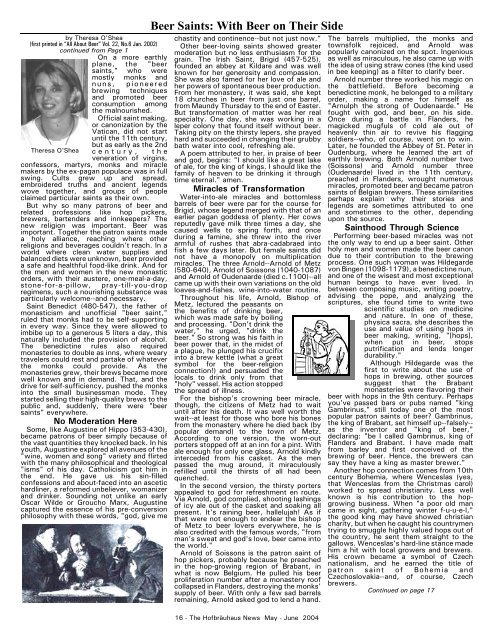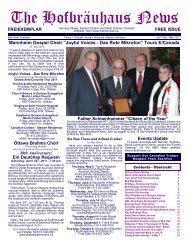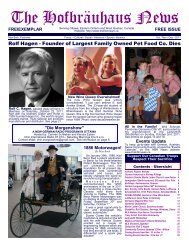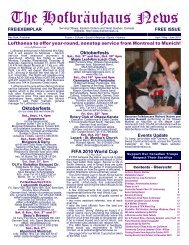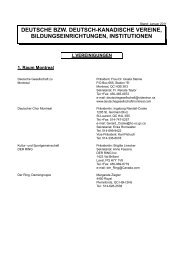Create successful ePaper yourself
Turn your PDF publications into a flip-book with our unique Google optimized e-Paper software.
y <strong>The</strong>resa O'Shea<br />
(first printed in “All About Beer” Vol. 22, No.6 Jan. 2002)<br />
continued from Page 1<br />
On a more earthly<br />
plane, the "beer<br />
saints," who were<br />
mostly monks and<br />
nuns, pioneered<br />
brewing techniques<br />
and promoted beer<br />
consumption among<br />
the malnourished.<br />
Official saint making,<br />
or canonization by the<br />
Vatican, did not start<br />
until the 11th century,<br />
<strong>The</strong>resa O'Shea<br />
but as early as the 2nd<br />
century, the<br />
veneration of virgins,<br />
confessors, martyrs, monks and miracle<br />
makers by the ex-pagan populace was in full<br />
swing. Cults grew up and spread,<br />
embroidered truths and ancient legends<br />
wove together, and groups of people<br />
claimed particular saints as their own.<br />
But why so many patrons of beer and<br />
related professions like hop pickers,<br />
brewers, bartenders and innkeepers? <strong>The</strong><br />
new religion was important. Beer was<br />
important. Together the patron saints made<br />
a holy alliance, reaching where other<br />
religions and beverages couldn't reach. In a<br />
world where clean water supplies and<br />
balanced diets were unknown, beer provided<br />
a safe and healthful food-like drink. And for<br />
the men and women in the new monastic<br />
orders, with their austere, one-meal-a-day,<br />
stone-for-a-pillow, pray-till-you-drop<br />
regimens, such a nourishing substance was<br />
particularly welcome--and necessary.<br />
Saint Benedict (480-547), the father of<br />
monasticism and unofficial "beer saint,"<br />
ruled that monks had to be self-supporting<br />
in every way. Since they were allowed to<br />
imbibe up to a generous 5 liters a day, this<br />
naturally included the provision of alcohol.<br />
<strong>The</strong> benedictine rules also required<br />
monasteries to double as inns, where weary<br />
travelers could rest and partake of whatever<br />
the monks could provide. As the<br />
monasteries grew, their brews became more<br />
well known and in demand. That, and the<br />
drive for self-sufficiency, pushed the monks<br />
into the small businessman mode. <strong>The</strong>y<br />
started selling their high-quality brews to the<br />
public and, suddenly, there were "beer<br />
saints" everywhere.<br />
No Moderation Here<br />
Some, like Augustine of Hippo (353-430),<br />
became patrons of beer simply because of<br />
the vast quantities they knocked back. In his<br />
youth, Augustine explored all avenues of the<br />
"wine, women and song" variety and flirted<br />
with the many philosophical and theological<br />
"isms" of his day. Catholicism got him in<br />
the end. He gave us his sin-filled<br />
confessions and about-faced into an ascetic<br />
hardliner, a reformed unbeliever, womanizer<br />
and drinker. Sounding not unlike an early<br />
Oscar Wilde or Groucho Marx, Augustine<br />
captured the essence of his pre-conversion<br />
philosophy with these words, "god, give me<br />
Beer Saints: With Beer on <strong>The</strong>ir Side<br />
chastity and continence--but not just now."<br />
Other beer-loving saints showed greater<br />
moderation but no less enthusiasm for the<br />
grain. <strong>The</strong> Irish Saint, Brigid (457-525),<br />
founded an abbey at Kildare and was well<br />
known for her generosity and compassion.<br />
She was also famed for her love of ale and<br />
her powers of spontaneous beer production.<br />
From her monastery, it was said, she kept<br />
18 churches in beer from just one barrel,<br />
from Maundy Thursday to the end of Easter.<br />
But transformation of matter was her real<br />
specialty. One day, she was working in a<br />
leper colony that found itself without beer.<br />
Taking pity on the thirsty lepers, she prayed<br />
hard and succeeded in changing their grubby<br />
bath water into cool, refreshing ale.<br />
A poem attributed to her, in praise of beer<br />
and god, begins: "I should like a great lake<br />
of ale, for the king of kings. I should like the<br />
family of heaven to be drinking it through<br />
time eternal." amen.<br />
Miracles of Transformation<br />
Water-into-ale miracles and bottomless<br />
barrels of beer were par for the course for<br />
Brigid, whose legend merged with that of an<br />
earlier pagan goddess of plenty. Her cows<br />
reputedly gave milk three times a day, she<br />
caused wells to spring forth, and once<br />
during a famine, she threw into the river<br />
armful of rushes that abra-cadabraed into<br />
fish a few days later. But female saints did<br />
not have a monopoly on multiplication<br />
miracles. <strong>The</strong> three Arnold--Arnold of Metz<br />
(580-640), Arnold of Soissons (1040-1087)<br />
and Arnold of Oudenaarde (died c.1100)--all<br />
came up with their own variations on the old<br />
loaves-and-fishes, wine-into-water routine.<br />
Throughout his life, Arnold, Bishop of<br />
Metz, lectured the peasants on<br />
the benefits of drinking beer,<br />
which was made safe by boiling<br />
and processing. "Don't drink the<br />
water," he urged, "drink the<br />
beer." So strong was his faith in<br />
beer power that, in the midst of<br />
a plague, he plunged his crucifix<br />
into a brew kettle (what a great<br />
symbol for the beer-religion<br />
connection!) and persuaded the<br />
locals to drink only from that<br />
"holy" vessel. His action stopped<br />
the spread of illness.<br />
For the bishop's crowning beer miracle,<br />
though, the citizens of Metz had to wait<br />
until after his death. It was well worth the<br />
wait--at least for those who bore his bones<br />
from the monastery where he died back (by<br />
popular demand) to the town of Metz.<br />
According to one version, the worn-out<br />
porters stopped off at an inn for a pint. With<br />
ale enough for only one glass, Arnold kindly<br />
interceded from his casket. As the men<br />
passed the mug around, it miraculously<br />
refilled until the thirsts of all had been<br />
quenched.<br />
In the second version, the thirsty porters<br />
appealed to god for refreshment en route.<br />
Via Arnold, god complied, shooting lashings<br />
of icy ale out of the casket and soaking all<br />
present. It's raining beer, hallelujah! As if<br />
that were not enough to endear the bishop<br />
of Metz to beer lovers everywhere, he is<br />
also credited with the famous words, "from<br />
man's sweat and god's love, beer came into<br />
the world."<br />
Arnold of Soissons is the patron saint of<br />
hop pickers, probably because he preached<br />
in the hop-growing region of Brabant, in<br />
what is now Belgium. He pulled his beer<br />
proliferation number after a monastery roof<br />
collapsed in Flanders, destroying the monks'<br />
supply of beer. With only a few sad barrels<br />
remaining, Arnold asked god to lend a hand.<br />
16 - <strong>The</strong> <strong>Hofbräuhaus</strong> <strong>News</strong> May - June 2004<br />
<strong>The</strong> barrels multiplied, the monks and<br />
townsfolk rejoiced, and Arnold was<br />
popularly canonized on the spot. Ingenious<br />
as well as miraculous, he also came up with<br />
the idea of using straw cones (the kind used<br />
in bee keeping) as a filter to clarify beer.<br />
Arnold number three worked his magic on<br />
the battlefield. Before becoming a<br />
benedictine monk, he belonged to a military<br />
order, making a name for himself as<br />
"Arnulph the strong of Oudenaarde." He<br />
fought with god, and beer, on his side.<br />
Once during a battle in Flanders, he<br />
magicked mugfuls of cold ale out of<br />
heavenly thin air to revive his flagging<br />
soldiers--who, of course, went on to win.<br />
Later, he founded the Abbey of St. Peter in<br />
Oudenburg, where he learned the art of<br />
earthly brewing. Both Arnold number two<br />
(Soissons) and Arnold number three<br />
(Oudenaarde) lived in the 11th century,<br />
preached in Flanders, wrought numerous<br />
miracles, promoted beer and became patron<br />
saints of Belgian brewers. <strong>The</strong>se similarities<br />
perhaps explain why their stories and<br />
legends are sometimes attributed to one<br />
and sometimes to the other, depending<br />
upon the source.<br />
Sainthood Through Science<br />
Performing beer-based miracles was not<br />
the only way to end up a beer saint. Other<br />
holy men and women made the beer canon<br />
due to their contribution to the brewing<br />
process. One such woman was Hildegarde<br />
von Bingen (1098-1179), a benedictine nun,<br />
and one of the wisest and most exceptional<br />
human beings to have ever lived. In<br />
between composing music, writing poetry,<br />
advising the pope, and analyzing the<br />
scriptures, she found time to write two<br />
scientific studies on medicine<br />
and nature. In one of these,<br />
physica sacra, she describes the<br />
use and value of using hops in<br />
beer making, writing, "[hops],<br />
when put in beer, stops<br />
putrification and lends longer<br />
durability."<br />
Although Hildegarde was the<br />
first to write about the use of<br />
hops in brewing, other sources<br />
suggest that the Brabant<br />
monasteries were flavoring their<br />
beer with hops in the 9th century. Perhaps<br />
you've passed bars or pubs named "king<br />
Gambrinus," still today one of the most<br />
popular patron saints of beer? Gambrinus,<br />
the king of Brabant, set himself up--falsely-as<br />
the inventor and "king of beer,"<br />
declaring: "be I called Gambrinus, king of<br />
Flanders and Brabant. I have made malt<br />
from barley and first conceived of the<br />
brewing of beer. Hence, the brewers can<br />
say they have a king as master brewer."<br />
Another hop connection comes from 10th<br />
century Bohemia, where Wenceslas (yes,<br />
that Wenceslas from the Christmas carol)<br />
worked to spread christianity. Less well<br />
known is his contribution to the hopgrowing<br />
business. When "a poor old man<br />
came in sight, gathering winter f-u-u-e-l,"<br />
the good king may have showed christian<br />
charity, but when he caught his countrymen<br />
trying to smuggle highly valued hops out of<br />
the country, he sent them straight to the<br />
gallows. Wenceslas's hard-line stance made<br />
him a hit with local growers and brewers.<br />
His crown became a symbol of Czech<br />
nationalism, and he earned the title of<br />
patron saint of Bohemia and<br />
Czechoslovakia--and, of course, Czech<br />
brewers.<br />
Continued on page 17


